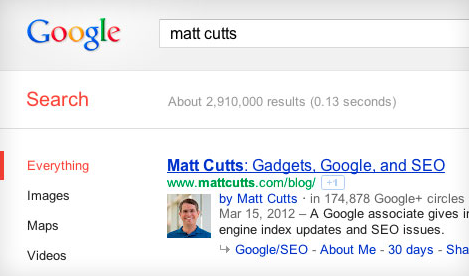At first, Google Authorship was just something that was interesting; not necessarily anything that SEOs or bloggers thought would be required for any of their websites or places on which they publish content. However, Google has begun to place more emphasis on Authorship as a way to identify and verify the authors behind web-based content.
Google is encouraging its adoption by ranking content from verified authors higher in search results, as well as displaying author headshots next to those search results, which increases their click-through rates.
While this is a good tactic to identify spam, Google is also using it as a gauge to determine content quality and how to better present and personalize search results to users.
The rel=author tag and online writers’ Google+ profiles are relatively easy to set up. Writers just enter the website URLs of the sites to which they contribute in the “About” section of their profile, then use the “rel=author” tag to identify their content on the publisher websites. If you have a site built on a popular CMS such as WordPress, there are many plugins that will do this automatically for you. For a complete walkthrough on setting up Google Authorship, see this article.
Because setting up authorship is relatively painless, the benefits make it worthwhile; especially because of this new emphasis on authenticated writers, which will likely continue to increase in importance.
Genuine Person, Genuine Content
The main idea behind Google’s push toward an author-verified web is that a genuine person behind content usually equals better content, and Google wants to display the best possible content for its users. For instance, a spammer publishing thousands of pieces of crappy content online isn’t going to have the ability or resources to build a social/online network that would even remotely resemble that of a “real” writer. Setting up authorship helps Google identify who the genuine authors are.
It should be relatively easy to tell a genuine author from one bent on spamming the internet. In order to ensure your web presence is seen as genuine in the eyes of Google, be sure you have:
· A completed Google+ profile, as well as profiles on other social networks
· Interlinking social media profiles across accounts
· A robust search engine presence that includes a website or blog
· Useful, related, and interesting status updates on Twitter, Facebook, LinkedIn, etc.
A spammy writer would only be willing to share or promote their own content, and does so in a meaningless, useless way (for a great example, just check out internet sensation @horse_ebooks on Twitter).
It may be naive, but imagine a world where every piece of content online had an author and a byline. The content would be better, more credible, and it would be easier to find out more about who wrote the articles you enjoyed reading most. Moving toward this type of transparency is helping Google make people responsible for what they put online.
Accountability
Making authorship important can help keep people accountable, because they’re not hiding behind content or fake author names. Again, this is another step toward making content better online — if all website content had a verified author, chances are that content would be much more valuable and high quality. In addition, with the implementation of Google Authorship, Google is helping authors protect their content. Authored content is much harder to steal than unclaimed content, as it provides Google with another signal of who the original source of the content is. This also will help eliminate the proliferation of scraper sites in the search results, which illegally claim other peoples’ content as their own in an attempt to benefit from it.
By pushing Authorship, Google is stressing the importance of writing great content that you should be proud to claim. Many beginning SEOs or writers have written content they aren’t proud of, from aiming for ridiculously-high keyword densities to somehow figuring out how to fit in all related phases of the term “buy dresses online.” Promoting Authorship is Google’s way of emphasizing that this type of black hat content isn’t going to help anyone’s website rankings.
Accountability can also help Google identify where else a writer has been published online, and direct more users to other content that the author has written or has shared in the past. This type of personalized search may help users personalize their online experience and find relevant information faster from sources they trust.
Create Connections
Authorship helps Google and authors, as the ability to create connections through search and social media results is mutually beneficial. Genuine authors can help Google create a better pattern of connectedness online, by being able to find and display other work by the author, results that show the author’s presence on social media, and related content based on what the author has written.
Eventually it wouldn’t be surprising for Google to start recommending other writers to followers or readers of one author. Seeing phrases like, “Like Steve Smith? You might like this article by John M. Doe” will most likely be more common in the future. In addition, Google can use the pathways of connected social media accounts and listed author contribution sites on a user’s Google+ profile to find out more about the author and where they can be found online.
Conclusion
No matter how Google Authorships benefits you — from an SEO perspective, to getting more visibility for your written content, or expanding the reach of your brand name and recognition — the fact remains that the push toward Google Authorship will only continue to help Google create a more authentic internet, while helping authors build their audience, credibility, and reach.
Larry is a tech fanatic who is immersing himself in modern culture and letting everyone know what he thinks via his second favorite thing, social media.

